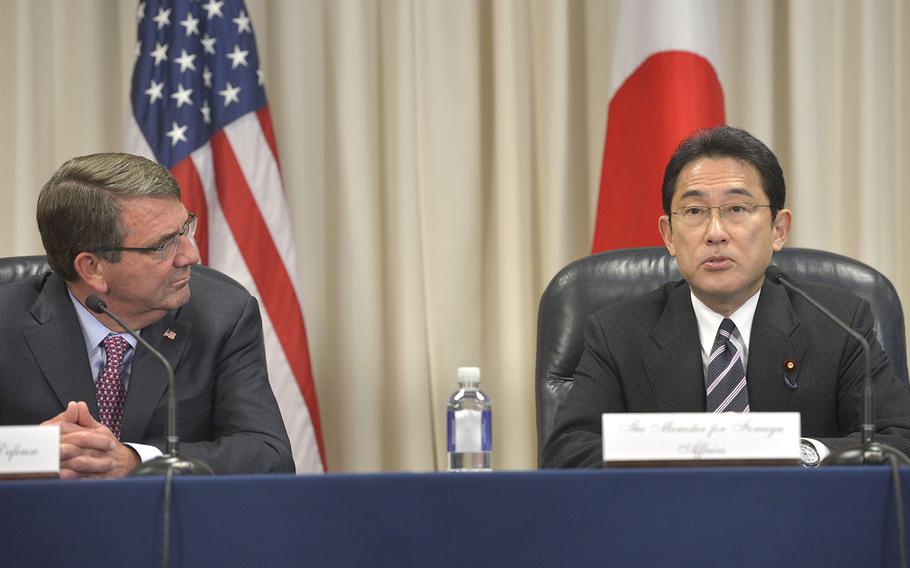
Secretary of Defense Ash Carter listens as Japan's Minister for Foreign Affairs Fumio Kishida makes brief remarks during a signing ceremony of the "Agreement to Supplement the Japan-U.S. Status of Forces Agreement (SOFA) on Environmental Stewardship" at the Pentagon Sept. 24, 2015. (Glenn Fawcett/Department of Defense)
WASHINGTON — The U.S. and Japan signed an accord Monday that will permit Japanese access to U.S. military facilities in Japan for environmental surveys.
The agreement — signed at the Pentagon by U.S. Defense Secretary Ash Carter and Japanese Foreign Minister Fumio Kishida — supplements the long-standing Japan-U.S. Status of Forces Agreement that allows the United States to maintain military bases in Japan. While this does not officially amend the SOFA, it is the first such bilateral supplement to the agreement since its implementation in 1960, according to a defense official who was speaking on condition of anonymity because he was not authorized to discuss the matter.
The agreement, Kishida said before signing, would bolster the relationship between the U.S. and Japan and alleviate concerns raised by communities neighboring U.S. military installations.
Both the U.S. and Japanese governments have been criticized in recent months by Okinawa Gov. Takeshi Onaga, who has said his island hosts an unfair percentage of American military stationed in Japan. Almost 75 percent of U.S. military posts in Japan are on Okinawa, which represents less than 1 percent of Japanese land, Onaga said. There are about 54,000 U.S. troops stationed in Japan, according to U.S. Forces Japan.
“This agreement is truly important and meaningful in enhancing local communities and gaining the support of the people (for) Japan-U.S. security agreements in the future,” Kishida said through a translator.
The SOFA supplement signed Monday allows the Japanese government to conduct environmental field surveys on U.S. bases after a spill or before transfer of the land back to Japan. It also paves the way for Japan to potentially take steps — including launching investigations — if it has a “reasonable basis” to believe hazardous materials, waste or other substances outside a U.S. facility are harming U.S. troops, the defense official said.
Previously, the agreement did not allow Japanese government or municipalities access to bases.
The agreement had been in the works since the countries began negotiations last February.
The U.S. will bear more responsibility for the environment at its sites in Japan, Kishida said.
“We are mindful about being good neighbors,” Carter said, adding the agreement is “a big step forward in our commitment … (and) a testament to the enduring strength of our partnership."
dickstein.corey@stripes.com Twitter: @CDicksteinDC